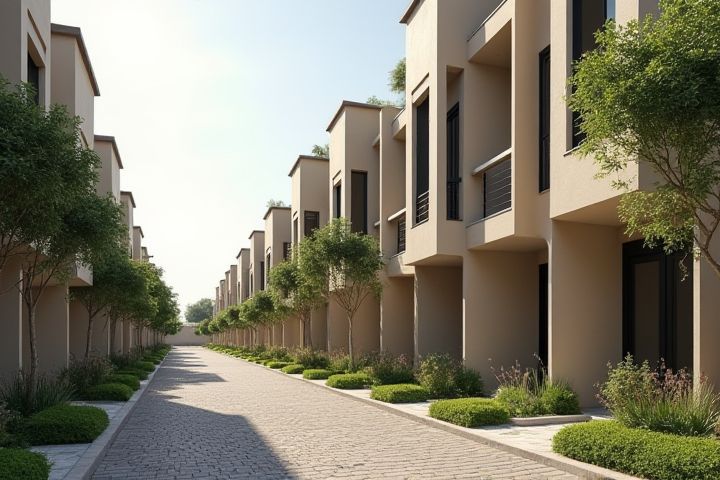
Housing development in Nigeria has been a critical response to rapid urbanization and population growth. With a housing deficit exceeding 17 million units, various projects aim to address this pressing issue through public-private partnerships and innovative financing models. Urban centers such as Lagos, Abuja, and Port Harcourt are witnessing a surge in affordable housing initiatives to provide accessible living options for low- and middle-income families. Key players in this sector include government agencies, real estate developers, and international investors, all focusing on sustainable practices and infrastructure improvements. By investing in housing development, you contribute to enhancing the quality of life and economic stability in local communities.
Urbanization trends
In Nigeria, rapid urbanization is significantly influencing housing development, with urban migration expected to accelerate the demand for residential spaces. Cities like Lagos, Abuja, and Port Harcourt are experiencing population surges, necessitating innovative housing solutions that address affordability and infrastructure demands. Sustainable building practices, such as eco-friendly materials and smart housing technologies, are increasingly prevalent, aiming to create livable environments that cater to both urban settlers and low-income families. Your understanding of these dynamics can inform real estate investments and policy-making that align with the country's growth trajectory and housing needs.
Government policies
Housing development in Nigeria is significantly influenced by government policies aimed at addressing the housing deficit and improving urban planning. Initiatives such as the National Housing Policy seek to provide affordable housing solutions, targeting low-income families to enhance accessibility. The implementation of mortgage finance schemes promotes home ownership, encouraging private sector investment in construction and real estate. Your understanding of these policies can help navigate opportunities in Nigeria's evolving housing market.
Infrastructure challenges
Housing development in Nigeria faces significant infrastructure challenges that hinder progress and accessibility. Poor road networks often limit the transportation of construction materials, delaying project timelines and increasing costs. Insufficient electricity supply affects the ability to construct energy-efficient buildings, while inadequate water and sanitation systems lead to health concerns in new developments. Addressing these infrastructure gaps is crucial for creating sustainable housing solutions that meet the needs of Nigeria's growing urban population.
Affordable housing initiatives
Housing development in Nigeria emphasizes affordable housing initiatives aimed at addressing the country's growing urbanization challenges. These initiatives involve partnerships between government, private sector developers, and financial institutions to create sustainable living conditions for low- and middle-income families. Innovative financing solutions, such as mortgage schemes and public-private partnerships, are being implemented to enhance accessibility to housing. By prioritizing affordability and sustainability, these initiatives are reshaping urban landscapes and improving the overall quality of life for residents.
Financial accessibility
Housing development in Nigeria increasingly emphasizes financial accessibility, making homeownership attainable for a broader segment of the population. Initiatives such as affordable mortgage schemes and low-interest loans are being implemented to overcome financial barriers. Real estate developers prioritize constructing cost-effective housing units tailored to meet the needs of low- and middle-income families. By leveraging public-private partnerships, the Nigerian government aims to enhance funding opportunities and encourage investment in sustainable housing projects across urban and rural areas.
Land acquisition issues
Housing development in Nigeria faces significant land acquisition challenges, which impede progress and affordability. Bureaucratic complexities and lengthy approval processes often delay the transfer of land titles to developers, complicating project timelines. Land tenure security remains a concern, as issues related to disputes over ownership and encroachments frequently arise. Addressing these obstacles is essential for enhancing housing accessibility and promoting sustainable urban growth in Nigeria.
Real estate market dynamics
Housing development in Nigeria is significantly influenced by the real estate market dynamics shaped by urbanization, population growth, and economic factors. With increasing demand for affordable housing, investors are exploring innovative construction techniques and financing solutions to meet the needs of various demographics. The rise of smart technologies and sustainable practices in real estate is transforming traditional building methods, making homes more energy-efficient and environmentally friendly. Understanding these market trends is crucial for stakeholders aiming to navigate the competitive landscape and capitalize on emerging opportunities in Nigeria's housing sector.
Environmental concerns
Housing development in Nigeria increasingly prioritizes environmental sustainability to address the pressing issues of urbanization and climate change. Developers are integrating eco-friendly materials, energy-efficient designs, and sustainable landscaping into new projects to minimize environmental footprints. Initiatives such as green roofing, rainwater harvesting, and the use of renewable energy sources are gaining popularity among homeowners and builders alike. By fostering a balance between human habitation and nature, these developments aim to create healthier living spaces while protecting the country's diverse ecosystems.
Public-private partnerships
Housing development in Nigeria increasingly emphasizes public-private partnerships (PPPs) to address the growing housing deficit. These collaborative models leverage the expertise and resources of both government and private sector stakeholders, streamlining project financing and execution. By fostering innovation, efficiency, and investment in infrastructure, PPPs enable the construction of affordable housing units that meet the diverse needs of urban and rural populations. Engaging in such partnerships not only enhances access to housing but also stimulates economic growth and job creation throughout the country.
Technological advancements
Housing development in Nigeria is increasingly embracing technological advancements to address the growing demand for affordable and sustainable housing solutions. Innovative construction techniques, such as modular building and 3D printing, are being utilized to expedite the construction process while minimizing costs. Smart home technologies, including energy-efficient appliances and home automation systems, are gaining popularity among developers, enhancing the living experience for residents. By integrating these technologies, Nigerian housing projects aim to provide not only shelter but also improved quality of life and environmental sustainability for communities.
